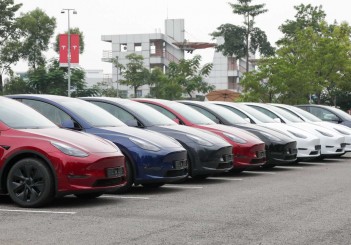Mercedes has its best shot yet this year to reclaim the luxury-car crown that BMW has held for a decade, a triumph that highlights the challenge facing BMW to re-energise the brand.
Yet the Munich-based company isn’t bringing any new models to this week's Geneva International Motor Show, in contrast with Daimler AG, which will show its bread-and-butter Mercedes E- Class sedan to European audiences for the first time, alongside a C-Class convertible.
“BMW has lost some of its dominance,” said Stefan Bauknecht, a Frankfurt-based portfolio manager at Deutsche Bank AG's DWS unit, which owns BMW AG shares. “Players who’ve had a weak phase have caught up.”
After filling all the niches from the 1-Series compact to the 7-Series, BMW's pipeline looks thin.
Chief executive officer Harald Krueger, in the job for almost a year, so far hasn’t laid out a strategy that can capture the imagination of customers and investors. By contrast, his counterpart at Daimler, Dieter Zetsche, has rejuvenated the fleet, pushed into segments that BMW previously dominated and boosted sales aggressively in markets such as China, where BMW's growth has slowed to a trickle.

The M760Li xDrive on display at the Geneva show. The car is not a new model as it is a muscled-up version of the current 7 Series. - EPA
READ ALSO: BMW to debut M760Li and i8 Protonic Red at Geneva
It's a turning of the tables: Just a few years ago, Mercedes appeared to have lost its mojo, Zetsche's tenure was being questioned and then-BMW CEO Norbert Reithofer had bragging rights with a carbon-fiber-framed sports car that got a cameo in a “Mission: Impossible” movie.
BMW's latest car highlights the challenges facing Krueger. Introduced just a few months ago, the 7-Series hasn’t made a notable dent in the lead commanded by Daimler's S-Class for top- of-the-line luxury sedans.
Sales of the BMW model in January were fewer than half the 8,500 deliveries posted by the Daimler rival. Making matters even tougher, Mercedes has differentiated its S-Class by introducing convertible, coupe and ultra-luxury Maybach variants.
BMW rose 1 percent to 74.61 euros as of 2:23 p.m. in Frankfurt trading. The stock has dropped 24 percent this year, the second-worst performance on the STOXX 600 Automobiles & Parts Index, which has declined 17 percent.
Falling behind Mercedes, the luxury-car industry's current No. 2, would cast a shadow over plans to celebrate BMW's 100th anniversary alongside German chancellor Angela Merkel on March 7 in Munich.
It also makes for a tough start for Krueger, who took charge in May. A notable sales lift won’t come soon. The next generation of BMW's 5-Series business sedan isn’t due before 2017, and the best-selling 3-Series may come in 2018. And Audi is also keeping up the pressure with new and refreshed SUVs, including the subcompact Q2 and an electric crossover, due in 2018, to challenge BMW's ‘‘i’’ line.
“BMW is probably at the worst point in terms of its relative product cycle in quite a while,” said Dominic O’Brien, a London-based analyst with Exane BNP Paribas.
BMW said it delivered a record number of cars in 2015, adding that a gain of 7.5 percent in sales during January was a “pleasing” start to the year.
While luxury-car makers tend to emphasise pricing over volume, sales rankings do matter. BMW often notes its No. 1 ranking, and last year the company offered US dealers unusually high incentives to refresh their service fleets.
Part of the reason BMW lacks near-term growth drivers is that it's already occupying just about every segment it can, even pushing into people carriers with the van-like Gran Tourer. That creates a difficult challenge for Krueger, who at 50 years old is the youngest CEO of a major automaker, as he tries to shift the company from its roots emphasising acceleration and handling to tackle the transformation of the car into a smartphone on wheels.
“Krueger's task is comparatively harder” because he's the first BMW CEO confronted with disruptive technologies that threaten the whole sector, said Ingo Speich, a fund manager at Union Investment. “They were able to generate a blockbuster every four to five years that also helped lift profitability. That's not so easy anymore.”
Investors’ focus will be more on the outcome of a strategy review expected on March 16, about 10 months since Krueger took over as CEO. BMW's last rethink was in 2007, when Reithofer pushed the sporty brand to invest billions to reduce fuel consumption. One result was the electric “i’’ venture that pioneered, with mixed results, the use of carbon fibre in mass- produced autos.
BMW's electric-car effort has stalled. The company hasn’t announced any followup models since rolling out the i8 plug-in hybrid sports car in 2014. The battery-powered i3 last year sold 24,057 cars, out of a total of 2.2 million BMW, MINI and Rolls- Royce deliveries, as low oil prices and patchy charging networks turn buyers off of electric vehicles.
Krueger will need to address challenges including technologies for self-driving and connected cars as well as investment in electric vehicles to keep up with emissions regulations. The company will probably say how it’ll address slower growth in China, where stellar sales in previous years helped generate the funds necessary for ventures like the “i” project, said Union Investment's Speich. Krueger must also emerge from the shadow of Reithofer, who took over as chairman after leaving his CEO post.
Krueger “really needs to provide some kind of big bang,” said Sascha Gommel, a Frankfurt-based analyst at Commerzbank AG. “He needs to show he's taking charge in terms of the strategy.”










